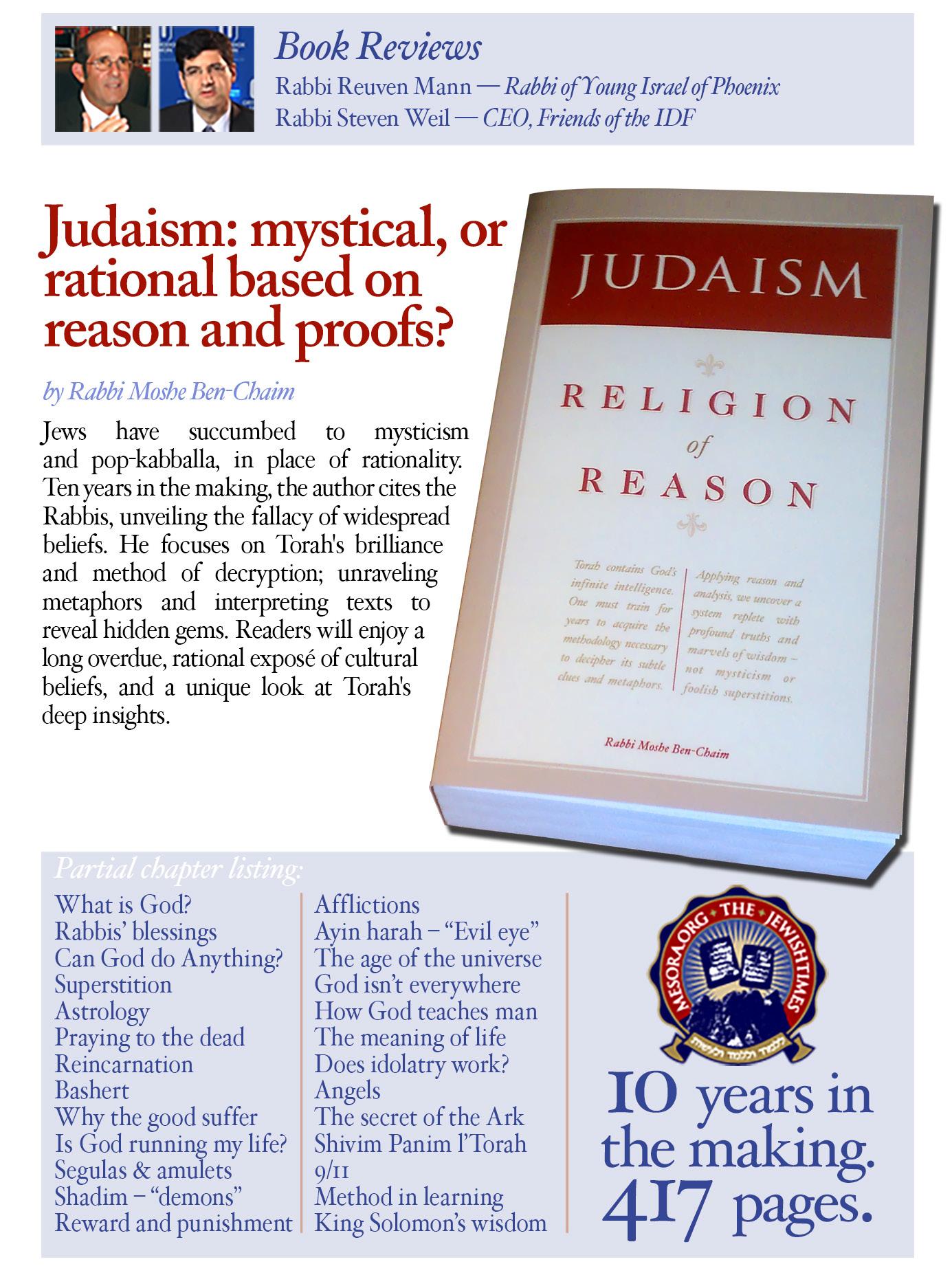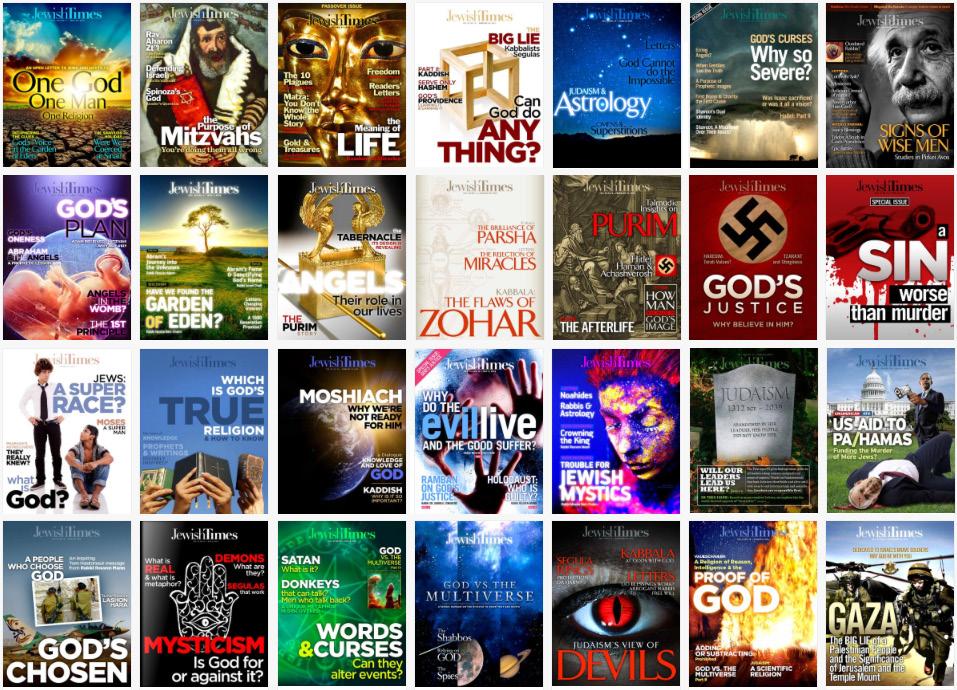



















DANI ROTH
How do we know it exists?
LETTERS
We can’t be quiet about this
RABBI MOSHE BEN-CHAIM
What can man know? How must we approach our studies?
RABBI MOSHE BEN-CHAIM
Determining metaphor and unraveling the message
RABBI REUVEN MANN
Bilam’s plan and the Jews’ self-trust

DANI ROTH: How can free will exist if the world is completely run by the laws of nature?
RABBI: How does nature a ect free will?
DANI ROTH Well I could say that every decision I make is just because of something that happened to me in the past, so it's not really free will.
RABBI: erefore you must say that free will is something which can be engaged, despite in uences or your emotions from previous situations. A person has the ability not to be a ected by his past but to make decisions based solely on his mind. Free will means that you can separate the e ect of your emotions and your history, and instead, follow your mind alone. But if a person were purely emotional, then you are correct: he just reacts based on his upbringing and his experiences without choice. But if a person uses his mind he can override the e ects of his emotions and choose his decisions based on his mind alone.
DANI ROTH: So then I guess you'd that this operates outside of nature, because it's an e ect without a cause.
RABBI: Exactly. A person who uses his mind is not following natural in uences. is means that the person's mind can operate without in uence from the emotions. at's exactly what God said to Cain when he wanted to kill his brother Hevel: “You can rule over your emotions."
DANI ROTH Ok, that makes sense. anks!

RABBI MOSHE BEN-CHAIM
READER: To make the statement, and I assume [you] actually believe it, that “Judaism is the only true religion” is not only wrong-headed, ignorant, and o ensive but feeds into a narrative of Jewish superiority and supremacy that has fueled antisemitism for centuries. To publish it is a true case of chillul hashem. I am a proud Jew, and as one, I need to ask you, what the hell are you thinking?

RABBI: Let’s review the published words:
“2 million Jews witnessed God’s Bible communication at Mt. Sinai. A one-time event of mass revelation. All other religions have no witnesses for their claims. Therefore they demand blind faith as they contain no proof of divine authorship. Had revelation never occurred, a history of a mass event would have never been accepted or transmitted.”
These are historic facts. To benefit all mankind, God orchestrated this event in front of millions, as He wished to validate for eternity His only religion. God does not wish this event be a secret. And this claim of possessing God’s true religion is defended by every religion; no one denies this. In this respect, the Jewishtimes does not di er from other religious claims. Furthermore, on dozens of occasions, the Jewish times has supported the view of human equality, and has outright rejected Jewish superiority as arrogant and false. We have fully rejected Jews claiming that Jews have a superior soul. Our current issue again echoes these truths.
Shavuos celebrates Revelation at Sinai. We appropriately underlined therein the key significance of that event with the words above. Jews have the obligation to teach mankind God’s truths with the same clarity God wrote His Bible, unapologetically. We observe the Sabbath, as Maimonides says[1] so we may respond to others inquiring of our rest on this day, to educate them on creation and monotheism. The Jew is not to hide any truth from mankind, for that is the worst evil.
God stated that all religions will eventually admit of their fallacy (Jer. 16:19).
God stated never to add or subtract from his Bible (Deut. 13:1). All other religions violate this.
God stated by keeping Torah—all it entails—the other nations will, in fact, be impressed by God's one religion. But you wish to conceal that which God desires be revealed:
Observe them faithfully, for that will be proof of your wisdom and discernment to other peoples, who on hearing of all these laws will say, “Surely, that great nation is a wise and discerning people” [Deut. 4:6].
Here, God teaches that with our proper observance of Torah, the nations will not be o ended, but in fact, will be greatly impressed, which is God's wish: that the entire world follows his one religion. Now, as God wants us to publicly follow the commandments, certainly He wishes that the proof that He gave the commandments should be shared. That proof is Revelation at Sinai, which singles out Judaism as the only true religion. Regarding you accusation of being “wrong-headed, ignorant, o ensive, claiming Jewish superiority and supremacy”… Torah and the Rabbis disagree with you.
Judaism is the only true religion, and God wishes this be known by mankind. Helping people see the truth is the greatest kiddush Hashem. ■

[1] Guide, book II, chap. xxxi







Rabbi Moshe Ben-Chaim

How can we safely and assuredly accept truths and reject falsehoods? First, it is crucial that we patiently think about ideas for ourselves, not trusting others, or defending notions because respected individuals shared them; this disease has infected many for too long. One’s reputation or massive followers cannot validate falsehood, even Moses made errors. And when two Rabbis have contradictory views, be they from previous generations or from today, one or both of them must be wrong. But they cannot both be right. We must be careful not to allow respect to trump reason. That is a corruption of the mind. If two people argue whether or not God exists “inside” the world, one view is wrong. You must be convinced of this, otherwise your mind is disengaged and you will learn nothing. You must use reasoning to determine who is correct and who is wrong. You must identify contradictions and gain the courage to disagree with anyone when your mind sees error. You must trust your mind. This is why God granted each one of us the faculty to think, and to arrive at proofs. God does not wish us to blindly follow others, but to think into matters carefully and arrive at our own conclusions. We must also realize when we don’t know something, and then persist in investigation and thought, until we prove or reject an idea conclusively. Do not let laziness win out over your pursuit for truth. Do not let the fear of arguing with others and their rejection of you be any concern when seeking truth. Rabbi Israel Chait said, “There’s no playing politics when seeking truth.” Meaning, there are no niceties: we must be ruthless when seeking truth, and our counterparts must have the same honest allegiance.
You must also be able to agree to a truth, even when your emotions find it disturbing. Do not allow your emotions to dilute or obscure truths.
(CONT. ON NEXT PAGE)
We must also veer from resisting truth when they conflict with our cherished beliefs. If you follow this essential, rigid and diligent path, you will learn what is real and reject what is false.
When is something true? Maimonides taught that truth conforms to 1 of 3 tests: 1) It is God’s word, 2) its is witnessed through our senses, or 3) reason dictates it must be so. 1) God’s word is Bible, Torah, Prophets and Writings. 2) Our senses see a car, or hear a jet; we know the car and jet to be real. 3) Seeing a book or a home, we know an author or builder exists, even without meeting them. But without God’s authority, physical evidence or reasoned conclusions, we do not accept any matter as true. For this reason we reject other religions, we do not accept space aliens as proven, and we don’t accept skyscrapers are accidentally formed.
How do we apply this to knowing what God is?
Moses asked God to teach him His true nature. God replied, “Man cannot know Me while alive” (Exod. 33:20). But Moses knew God existed, as did Abraham, Isaac, Jacob, Sarah, Leah, Rachel, Aristotle, Einstein and all wise people.
As our prayers state, we refer to God as the creator of the universe. He is not Earth’s

“energy,” nor is He “in” the universe: both are physical properties. Energy and physical existences are all creations. Thus, God is not “energy,” and God is also not “in” the universe, since before the universe was created, God existed. Thus, He exists separate from the physical, spatial universe, and therefore He does not occupy space or location, which are physical. Space is a creation. God exists without space. Just as an idea does not occupy space, yet it exists, God too does not occupy space. God is not “here or there.” He exists in a way we cannot grasp while alive. This might be a more di cult challenge for people who wish to force God into our 3-dimensional space. They cannot imagine something outside of our 3 dimensions, and therefore corrupt their view of God, by suggesting He exists inside the world. Some people go so far as to claim that there is a part of God inside every human. Again, motivated by human need, this view is also corrupt.
As God created all that is physical, God is not physical. He has no place. We cannot know what He is. But we know He is the cause of all that exists, and that means there is no other power; He is the “only” cause for everything that exists. Blow after blow during the 10 Plagues, all Egypt’s gods were inanimate and silent. All peoples’ gods were—and are—silent; no people ever experienced metal or ivory idols move, act or communicate with them.
All existences require God’s will to continue existing. God’s creation does not dictate
continued existence. After God created you, you continue to exist only as He also wills your continuation. Being created does not demand continued existence.
From God’s Torah, we learn that God is perfectly just, that He knows all, including every person’s actions and thoughts, as with Cain. We learn that God punishes man for his sins, and rewards those that are close to Him; He saved the Jews from Pharaoh. God is merciful, as He canceled His planned destruction of Ninveh when those Assyrians repented wholeheartedly (Book of Jonah). We know that God favors charity and righteousness, as these were Abraham’s traits which God praised (Gen. 18:19). God also records Rebecca running to serve Eliezer at the well, endorsing kindness.
What is God? He is the cause of the universe, Who is not physical, Who is not “in” the world, and Who designed Earth for man’s benefit. He is the cause of everything, Who wishes man to have the most enjoyable existence through engaging wisdom and morality. We don’t know why God created what He did, but we can know what He created, and what His will is for mankind: Torah. We can appreciate the great potential we each have due to God’s kindness and His will that we possess a soul, an intellect, that can find the greatest enjoyment in the pursuit of His wisdom, as seen in Torah and in the universe. God is the only Cause of the universe Whom we must praise and thank. ■





his donkey. Torah states that the donkey saw the angel standing in the path with an outstretched sword in his hand, and that the donkey turned aside and went into the field. Bilam hit the donkey to return it to the path. The angel stood a second time in the vineyard. There was a fence on both sides of the donkey and Bilam. The donkey saw the angel and pressed up against the wall in avoidance, crushing Bilam’s leg. Bilam continued to smite the donkey. The angel passed to a place that was narrow with no room to pass left or right. The donkey saw the angel and crouched down under Bilam and Bilam’s anger burned, smiting the donkey – this time, with a stick. God opened the mouth of the donkey and it said to Bilam, “What have I done that you have smitten me these three times?” Bilam responded, “Because you have mocked me. If there were a sword in my hand I would kill you.” The donkey said, “Am I not the donkey that you have ridden upon from long before until today? Is it my nature to act this way?” Bilam replied, “No.”
The story of Bilam and his donkey contains unbelievable events and is described in great detail. As the account in Numbers 22:21 goes, Balak was the king of Moav at that time and was faced with the fear of millions of Jews damaging his land by gaining safe passage. To avert this problem, Balak called upon Bilam, a Prophet, and requested that Bilam curse the Jews so that Balak would have ease in attacking them and in driving them out. When Balak sent the first group of messengers to Bilam, Bilam’s reply was that he must consult with God. God’s answer was that Bilam should not curse the Jews for they are blessed. Bilam informed the messengers that he was restrained from going by God’s word. Balak persisted and sent more messengers; now higher in rank. Bilam responded by saying, “Even if my house was filled with silver and gold I couldn’t go.” Nonetheless Bilam requested an answer from God. This time God gave him permission, however, he still must refrain from cursing the Jews. What happens next is quite remarkable. Bilam arose early and God was angry that he went. (This was after God gave him permission) God placed an angel in the path to deter him as he was riding on
God then opened Bilam’s eyes and he saw the angel of God standing in the path with a sword outstretched in his hand. Bilam then prostrated himself before the angel. The angel said to Bilam, “For what have you smitten your donkey these three times? Behold I have come out to turn you away because your way is contrary to me. Your donkey has seen me and turned aside these three times. Would it be that you would turn aside. Because now I would kill you and cause her (the donkey) to live.” Bilam says, “I have sinned. I didn’t know that you stood in the path to turn me aside. And now if this is bad in your eyes, I will return.” The angel informs Bilam that he may continue, but only that which he tells him may he say. Rashi states that the significance of “three” times represents two things: the three forefathers, and the three Jewish festivals. Ibn Ezra states that once the donkey spoke it died, and that with each successive hitting, Bilam used a stronger object.
Following are questions on this section, including the meaning behind both Rashi’s and Ibn Ezra’s statements:
1) Why didn’t Bilam see the angel of God at first?
2) What’s the significance of the sword?
3) Why, according to Ibn Ezra, did Bilam hit the donkey with a stronger object each time?
4) Why did the donkey die after it spoke?
5) What was the argument of the donkey?
6) Why wasn’t Bilam astounded at the ability of an animal to talk?
7) What does the fence allude to, and why did the path become more and more impossible to traverse with each appearance of the angel?
8) Of what significance is it that Bilam’s leg was crushed? Maimonides states (Guide for the Perplexed, book II, chap. XLII) that every case in Scripture where we find an angel appearing or talking, the entire account is describing a vision, and not an actual physical event. The event didn’t take place in physical reality, but in a person’s mind. This being the case, this entire story must be interpreted in this light, according to Maimonides. This is a parable for a conflict with which Bilam was struggling.
If we refer to the events leading up to Bilam riding on the donkey, we see that Bilam comes o appearing as a true follower of God. But with a closer look, his true nature is seen.
He was asked to curse the Jews. God told him he could not. The fact that Bilam (during the account of the second messengers) requests from God again to know whether he can curse the Jews shows that he wanted to curse them. That’s why he said, “God has restrained me from cursing.”
Meaning that he really desired to curse, but God prevented him.
This desire to curse the Jews awoke in Bilam a strong conflict. On the one hand, he desired the destruction of the Jewish people. On the other hand, he knew that God blessed the Jews. Bilam was well aware that God’s establishment of His Providence over the Jews was due to our forefather’s perfection. Abraham’s self-realization of the absurdity of idolatry, his conclusion of the reality of monotheism and the oneness of God secured this treaty of God’s Providence. With this knowledge, Bilam was greatly troubled as to which path to follow, namely 1) his desire for the destruction of the Jews, or 2) the word of God. This entire account is a parable of his conflict.
Interpreting the elements of this story as representing psychological phenomena, the story’s real meaning can be explained.

Bilam, in great conflict, decides to travel to Balak with the goal of cursing of the Jews. In order to do so, he must suppress his knowledge of God’s command to refrain from cursing them. Riding on his donkey represents the suppression of what his conscience (the donkey) “sees.” “Riding” conveys dominion over another object. Bilam himself (in this vision) represents his evil instincts and thus, isn’t aware of reality (the angel of God). One’s instincts aren’t designed with the ability to judge what is morally good or evil. Instincts are not perceivers: they simply emote. This explains why Bilam couldn’t “see” the angel. Bilam, in this story, represents his instincts—a faculty of man unable to perceive. Instincts have only one function: they guide a person towards instinctual satisfaction.
The donkey represents Bilam’s conscience: the part of man that detects good and evil. The angel represents reality, or his intellect: the ability to perceive what is real and true. Bilam’s inability to curse the Jews was so threatening, it was represented by an angel of God wielding a sword, a very terrifying sight. The conscience, represented by the donkey, is designed to perceive and make value judgments. This is its main function. Now that we understand the main components of the parable, (Bilam, his donkey, and the angel represent respectively the

“A word fitly spoken is like apples of gold in vessels of silver" (Prov. xxv. 11). Hear the explanation of what he said. The word maskiyoth, the Hebrew equivalent for “vessels” denotes “filigree network,” i.e., things in which there are very small apertures, such as are frequently wrought by silversmiths. They are called in Hebrew maskiyyoth (lit. “transpicuous,” from the verb sakah, “he saw,” a root which occurs also in the Targum of Onkelos, Gen. xxvi. 8), because the eye penetrates through them. Thus Solomon meant to say, "just as apples of gold in silver filigree with small apertures, so is a word fitly spoken." See how beautifully the conditions of a good simile are described in this figure! It shows that in every word which has a double sense, a literal one and a figurative one, the plain meaning must be as valuable as silver, and the hidden meaning still more precious: so that the figurative meaning bears the same relation to the literal one as gold to silver.
Maimonides, Intro to the Guide
instinctual drive, the conscience, and reality), we must interpret this account accordingly.
Bilam riding on his donkey is interpreted as his evil instincts are riding (suppressing) his conscience. His conscience alone is aware of the reality – “the donkey sees the angel,” but Bilam doesn’t. Whenever the conscience goes “o of the path,” it means Bilam’s conscience becomes more conscious, making Bilam sense his error. Therefore, Bilam suppresses his conscience – “hitting the donkey.” His conscience slows him down – “crushes his leg” – as he tries to go on his “path.” Bilam’s weapon for suppressing his conscience becomes stronger – “he hits the donkey with a stick.” Then the conscience finally prevails – “the donkey talks.”
The argument of the donkey is that “it’s not me who’s at fault” – meaning that Bilam gains insight (from his “talking conscience”) into his actions and realizes that there’s something behind his suppression of his conscience. At this point, Bilam becomes aware of his denial only through God’s kindness. That’s why God had to open his eyes. The donkey dying after it spoke means that once his conscience made him aware of this information, the conscience ceases to function – termed here as death. It did its job. It “dies.”
Rashi’s statement that the three things
shown to Bilam’s donkey alludes to the three forefathers and the three festivals fits in beautifully: the donkey – Bilam’s conscience – was contemplating the primary reason for God’s direct Providence over the Jews, namely the perfection of our forefathers –which entitled the Jewish nation to God’s Providence. Bilam’s conflict was directly caused by these three individuals (Abraham, Isaac and Jacob). Had it not been for them, he might have been able to curse the Jews. That’s why the donkey turned aside (Bilam's conscience experienced greater conflict) when it thought about the forefathers. Abraham, Isaac and Jacob brought about the relationship with God, and now, Bilam desired to curse them! But all curses are from God. We also see why Bilam acted calmly towards a talking animal, as Maimonides states, this was all a vision.
In summary, the entire account of Bilam and his donkey – according to Maimonides –was a vision or conflict, happening only in his mind. In order for the Torah to inform us of this, the Torah writes it as a metaphor so that many ideas and psychological principles can be capsulated into one account. A parable also conceals ideas from those who would shrug at them, if they were written openly.
The fact that Bilam did travel to Balak in physical reality is not discounted by this explanation. ■



This week’s Parsha, Balak, is riddled with di culties. This king was fearful of Bnei Yisrael (the Children of Israel)–although it is not clear why–and despairing of natural remedies, sought the services of the master of occult arts, Billam. He was reputed to be proficient at toppling nations through the power of his curses. Balak believed that if he could get this soothsayer to utter imprecations against his imaginary enemies, his problems would be solved. So, he was prepared to o er him any amount he desired to use his skills in this endeavor.
However, Hashem intervened on behalf of His People and warned Billam not to curse them. He could, if he desired, accompany Balak’s messengers, but he was bound to declare only those words that Hashem revealed to him. Accordingly, Billam proceeded, and despite the extreme anger of Balak, pronounced numerous blessings upon Am Yisrael (the Nation of Israel). Hashem, thereby, rescued the Israelites from the danger represented by Balak and even transformed his damnations into the most beautiful blessings. While it seems that Billam was rendered harmless by Hashem’s intervention, the matter is not so simple.
The story of Billam is immediately followed by a catastrophe that seems even worse than that of the Golden Calf. Suddenly, out of nowhere, the Midianite women seduced the Israelite men into sexual relationships which carried with them the prerequisite worship of Baal-Peor–the most disgusting and repulsive form of idol worship. This sin was so egregious that Hashem smote His People with a plague that claimed the lives
of twenty-four thousand sinners.
We must seek to comprehend this ba ing tragedy, which according to our Rabbis was undertaken at the instigation of Billam. How could the men have been so vulnerable to this evil ploy? Did they not know that by consorting with these promiscuous women, they violated a serious sexual prohibition, as well as the fatal Aveira (transgression) of Avodah Zara (idolatry)? What weakness did Billam discern in Bnei Yisrael's character that motivated him to o er this lethal advice?
To fully understand this matter, we must recognize the seriousness of the problem of intermarriage. The reason why the Torah prohibits marrying a Gentile is stated in Exodus 34:15:
“Lest you seal a covenant with the inhabitant of the land; and stray after their gods, slaughter to their gods, and he invites you, and you eat from his slaughter. And you take their daughters for your sons; and their daughters stray after their gods and entice your sons to stray after their gods!”
Billam had great insight into human nature, but his true desire was to inflict su ering on people and societies. He sought to defeat Bnei Yisrael by manipulating them into a position where their own G-d would mete out their punishment. He well understood the terrible consequences that would occur to the men who indulged their lust for foreign women. And this evil “prophet” fully believed the Torah teaching, that if one marries an idolater, he will soon find himself engaging in vile paganistic practices. If only the Israelite men
themselves had been more respectful of the words of Torah, and less confident of their own self-control. In Parshat VaEtchanan the Torah warns against adding or subtracting components to the Mitzvot . Then, to bolster this point, it states:
“Your own eyes see what the L-rd did because of Baal-Peor; for every man who strayed after Baal-Peor, the L-rd your G-d destroyed him from amongst you. And as for you, who cleaved to the Lord your G-d; all of you are alive today. (Devarim 4:3-4)”
The Seforno explains the connection between the incident of Baal Peor and the prohibition against adding to or subtracting from the Torah. He says:
“Behold, that which you saw happening regarding Baal-Peor attests to this, for indeed, those who sinned with idolatry did not initially intend to do so, but their original intention was [only] to commit harlotry, as it says, ‘ and the people began to commit harlotry . (Numbers 25:1)’ And although the Torah prohibited this because of the fear that [harlotry] will lead to idolatry, as it says, ‘ And their daughters will go astray [be promiscuous] and make your sons go astray [be promiscuous] , (Exodus 34:16)’ nonetheless, each one of them thought that it would never happen to him, but behold the opposite occurred. ‘ For all the men that followed the Baal-Peor …’ to cleave unto his daughters, not one of them with all of his wisdom was able to avoid stumbling into the sin of idolatry until ‘… Hashem Your G-d destroyed him .’”
According to the Seforno the Midianite women were successful in seducing the Israelite men because

the sinners thought that said promiscuity was only prohibited because it could lead to idolatry. And they were brazenly confident that that could not happen to them, that they could indulge their lusts with these women and yet refuse their importuning to join them in their worship.
In my opinion, even if their assessment of their self-control was accurate, they were wrong to evaluate their observance of the commandments in this way. We have no right to determine that a certain prohibition of the Torah may be sidestepped by maintaining that the danger it guards against is irrelevant to us. Indeed, even as great an individual as Shlomo HaMelech erred in this regard. How so?
The King of Israel is prohibited from “increasing wives”, i.e., exceeding eighteen, lest they turn his heart from the proper service of Hashem. Shlomo reasoned, “I will marry, and they won’t turn my heart.” The Navi (Kings I 11:4-8) testifies that in his old age, the idolatrous wives prevailed upon him to build houses of pagan worship for them in Yerushalayim. We therefore see, that it is perilous for even the wisest of men, to rationalize their observance of the Torah in this way.
And certainly, people of lesser wisdom, such as ourselves, are not in the position to make these types of calculations. Does anyone have such in-depth knowledge of himself that he can say with certainty that he will not sin when subjected to a certain great temptation?
Indeed, the Rabbis have clearly warned us, “Do not believe in yourself until the day you die” (Berachot 29a). But shouldn’t a person believe in himself and his abilities? Without this, won’t he lack the self-confidence necessary for a life of accomplishment and success? So why would the Rabbis seemingly urge a person not to believe in himself?
In my opinion, they are not speaking concerning a person’s practical
capabilities. If someone has studied medicine well, and apprenticed su ciently under capable physicians who have tested and approved him, he should be confident of his talents and employ them accordingly. But, when it comes to guarding against sin, a person should never be complacent about his Yeitzer HaRah (Evil Inclination); concerning which the Torah warns that, “… sin rests at the door; and its desire is toward you, yet you can conquer it” (Bereishit 4:7).
The Rabbis warned that one should not believe he has reached the level where he can be relaxed about his Yeitzer HaRah . Even the most G-d-fearing person can be subjected to a temptation that he cannot resist. Billam’s evil insight was that Bnei Yisrael are sometimes too clever for their own good, and when they want something that is forbidden, they can provide the rationalizations that enable and facilitate their indulgence. We must therefore cultivate an attitude of absolute honesty regarding our motivations, and learn to di erentiate between objective thinking and self-serving distortions. In addition, a keen awareness of our own vulnerabilities should a ect our feelings toward others.
One should not look down on “sinners” whom he deems weak in controlling their urges. By doing so, he indulges a sense of spiritual superiority, which can easily lead to moral transgressions. Rather, we should be patient with all people; especially those who struggle with desires that we may not be able to understand or relate to. We should pray to Hashem to assist us in avoiding being ensnared by our Yeitzer HaRah, as individuals and as a society. For ultimately, it is only with the assistance of Hashem, that it is possible to be victorious in the Milchemet HaChaim (Struggle of Life).
Shabbat Shalom.. ■





All books depict history, facts, theories, fiction or poetry. No book is coded with hidden messages beyond the words or patterns revealing marvels. But the Bible (Torah) was written by God, and is “coded.” The order of verses, use of certain phrases, apparent contradictions and other Biblical patterns are pur poseful clues to God’s wisdom.
This book unveils those patterns and shares the hidden messages.




